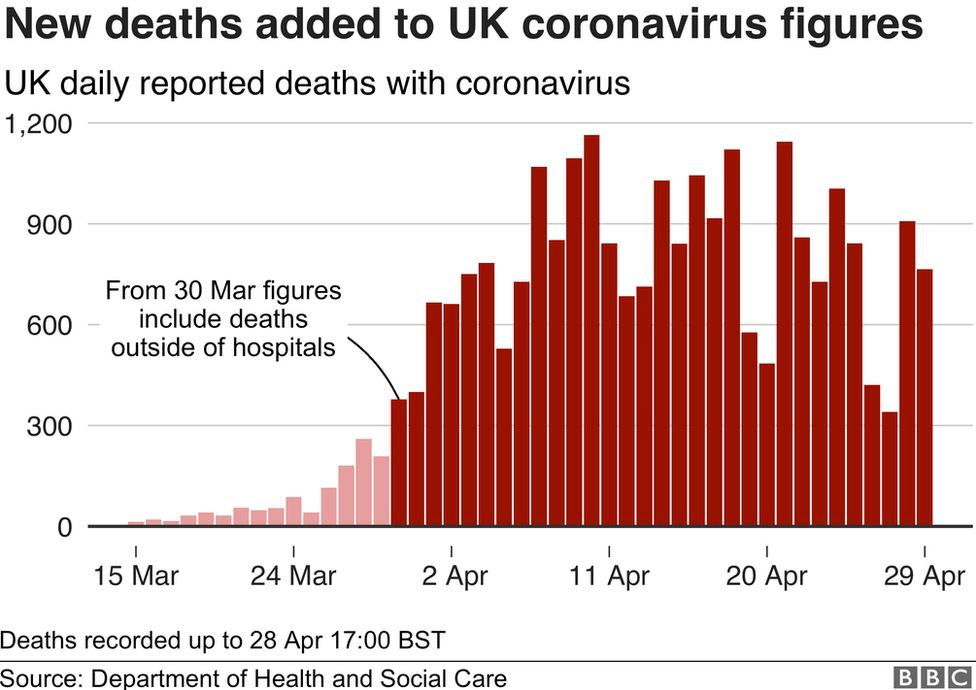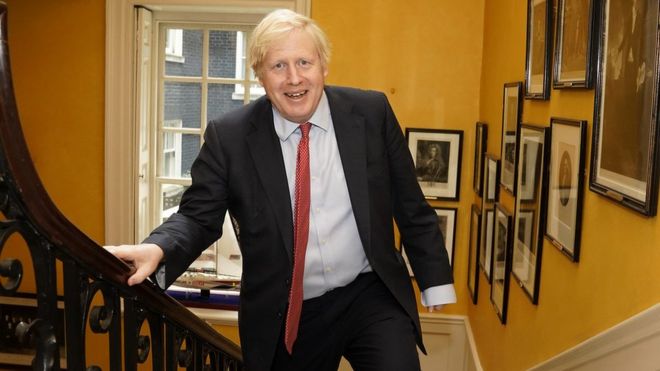Prime Minister Boris Johnson will chair a cabinet meeting later and then lead the daily coronavirus briefing for the first time since his return to work.
No 10 said the PM, whose fiancee gave birth on Wednesday, will update the UK on the “fight against this disease and the steps we are taking to defeat it”.
But political editor Laura Kuenssberg said he was unlikely to give “chapter and verse” on lifting the restrictions.
No 10 also faces the deadline for its target of 100,000 daily virus tests.
Health Secretary Matt Hancock pledged to reach the goal by the end of April. The latest figures show it reached just over 52,000 coronavirus tests on Tuesday.
A scientist advising the government on testing, Prof John Newton, said he is “pretty confident” the government will hit the target, but warned there will be a lag in the data.
He said it would not be clear whether the target had been reached until the end of the week.
However, Justice Minister Robert Buckland admitted the target might not be met by the end of April.
The government’s chief scientific adviser Sir Patrick Vallance and chief medical officer Prof Chris Whitty will appear alongside the prime minister at Thursday’s briefing.
Mr Johnson, who has just recovered from Covid-19, returned to work in Downing Street this week but missed Prime Minister’s Questions on Wednesday following the birth of his son with his fiancee Carrie Symonds.
What’s next? The prime minister will not give chapter and verse later today on exactly how and when the country’s doors will re-open.
But after meeting his cabinet virtually, Boris Johnson will seek to explain to the public how and why, if not exactly when, they will make the decisions that are vital, not just to our health, but the country’s suffering economy too.
He’ll restate the hurdles that must be passed before any restrictions are lifted, including making sure the NHS can cope, with tests, and equipment, and a consistent fall in the death rate.
Crucially he will emphasise the importance of the so-called “R” rate of infection – in other words, the extent to which people with the virus are passing it on.
That rate has come down significantly since the lockdown was imposed, slowing the spread of the disease. But Mr Johnson will outline how the “R” rate will be a crucial yardstick of whether to lift, or even reinstate, restrictions as the weeks go on.
It comes as the Scientific Advisory Group for Emergencies (Sage), which is working on a range of options for easing lockdown restrictions, prepares to meet later. The lockdown is due to be reviewed on 7 May.
Justice Secretary Robert Buckland said Sage would be reporting to the prime minister and to cabinet, with decisions about any easing of the lockdown being made on the basis of the evidence they provided.
However, he added: “Being absolutely frank, I don’t think you’re going to hear specific detail – I think that would be premature.”
Earlier this week, Mr Johnson said the lockdown would not be relaxed too soon and details on any changes would be set out over the “coming days”.
At Wednesday’s press conference, Foreign Secretary Dominic Raab said the UK was still “coming through the peak” of the virus and called for people to maintain social distancing measures “until we are out of the woods”.
The total number of people who have died in the UK with coronavirus has now passed 26,000, as official figures include deaths in the community, such as in care homes, for the first time.
A new method of counting includes retrospective deaths since the beginning of March.

Testing target
Meanwhile, the government is facing questions over its target of 100,000 tests a day by the end of April.
A report by NHS Providers, which represents hospitals and NHS trusts in England, dismissed the target as a “red herring” and said it risked preventing the development of a “proper, next stage testing strategy”.
Mr Buckland said even if the target wasn’t met “we are well on our way to ramping this [testing] up” and “we are straining every sinew to get there”.
“100,000 is an important milestone, but frankly we need more,” the justice secretary told BBC Breakfast.
A spokesman for the Department of Health and Social Care said testing was “absolutely critical” and capacity at NHS and PHE laboratories had more than doubled within weeks.

In other developments:
Captain Tom Moore, who raised more than £30m for the NHS by walking laps of his garden, has been made an honorary colonel on his 100th birthday
Pharmaceutical giant AstraZeneca has agreed to manufacture and distribute a coronavirus vaccine being developed by the University of Oxford if it proves effective
London’s transport system may be unable to cope with a surge in demand when lockdown measures are lifted, a briefing to emergency planners says
Sainsbury’s says customers are likely to see disruption to their shopping, including socially-distanced queues, until September
Firms that fail to refund people for holiday and weddings cancelled because of the pandemic could face legal action by the consumer watchdog
Coronavirus could prompt the biggest changes to jury trials since World War Two, the head of judiciary in England and Wales says


